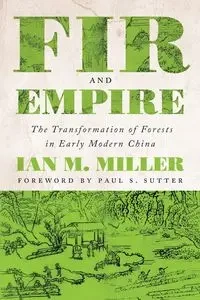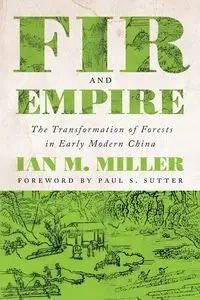Fir and Empire - Ian M. Miller
- The Transformation of Forests in Early Modern China
A CHOICE OUTSTANDING ACADEMIC TITLE
Restores China’s place in forest history
The disappearance of China’s naturally occurring forests is one of the most significant environmental shifts in the country’s history, one often blamed on imperial demand for lumber. China’s early modern forest history is typically viewed as a centuries-long process of environmental decline, culminating in a nineteenth-century social and ecological crisis. Pushing back against this narrative of deforestation, Ian Miller charts the rise of timber plantations between about 1000 and 1700, when natural forests were replaced with anthropogenic ones. Miller demonstrates that this form of forest management generally rested on private ownership under relatively distant state oversight and taxation. He further draws on in-depth case studies of shipbuilding and imperial logging to argue that this novel landscape was not created through simple extractive pressures, but by attempts to incorporate institutional and ecological complexity into a unified imperial state.
Miller uses the emergence of anthropogenic forests in south China to rethink both temporal and spatial frameworks for Chinese history and the nature of Chinese empire. Because dominant European forestry models do not neatly overlap with the non-Western world, China’s history is often left out of global conversations about them; Miller’s work rectifies this omission and suggests that in some ways, China’s forest system may have worked better than the more familiar European institutions.
The open access publication of this book was made possible by a grant from the James P. Geiss and Margaret Y. Hsu Foundation.
EAN: 9780295752877




A CHOICE OUTSTANDING ACADEMIC TITLE
Restores China’s place in forest history
The disappearance of China’s naturally occurring forests is one of the most significant environmental shifts in the country’s history, one often blamed on imperial demand for lumber. China’s early modern forest history is typically viewed as a centuries-long process of environmental decline, culminating in a nineteenth-century social and ecological crisis. Pushing back against this narrative of deforestation, Ian Miller charts the rise of timber plantations between about 1000 and 1700, when natural forests were replaced with anthropogenic ones. Miller demonstrates that this form of forest management generally rested on private ownership under relatively distant state oversight and taxation. He further draws on in-depth case studies of shipbuilding and imperial logging to argue that this novel landscape was not created through simple extractive pressures, but by attempts to incorporate institutional and ecological complexity into a unified imperial state.
Miller uses the emergence of anthropogenic forests in south China to rethink both temporal and spatial frameworks for Chinese history and the nature of Chinese empire. Because dominant European forestry models do not neatly overlap with the non-Western world, China’s history is often left out of global conversations about them; Miller’s work rectifies this omission and suggests that in some ways, China’s forest system may have worked better than the more familiar European institutions.
The open access publication of this book was made possible by a grant from the James P. Geiss and Margaret Y. Hsu Foundation.
EAN: 9780295752877

